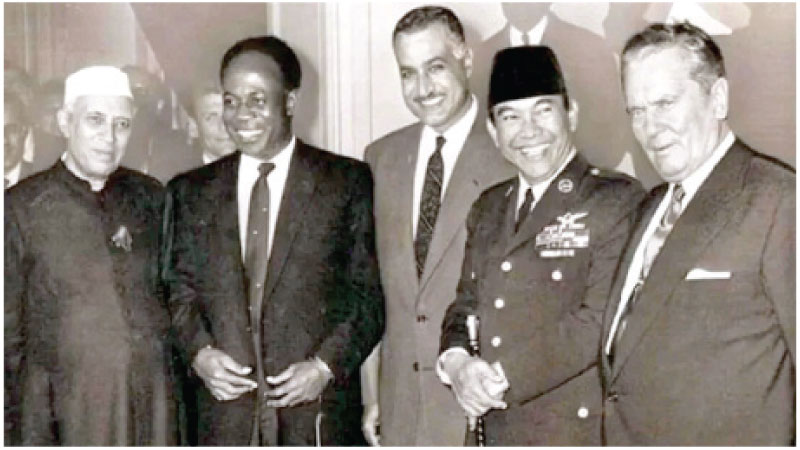If nations of the Global South rediscover the habit of solidarity, grounded not in nostalgia but in mutual self-interest, they can negotiate with creditors, investors and superpowers on more equal terms.
In 1955, leaders of the Global South gathered in Bandung, Indonesia, to carve a path that allowed them to navigate the Cold War between the United States and the Soviet Union without taking sides. It was at this summit that the voice of the newly decolonised world was heard first on the world stage. The summit also marked the birth of the Non-Aligned Movement (NAM).
Seventy years later, the Global South, especially smaller nations such as Sri Lanka, are again being asked to pick between the United States and China in a new Cold War.
United States administrations since Barack Obama have been trying to contain China. The Middle Kingdom has responded by forging closer ties with Eurasia and protecting its maritime interests in a more assertive manner. The U.S., starting from the first Trump administration, has made it clear that countries that are not with them are against them. China has said it will not take kindly to agreements that undermine its interests.
Given these developments, some thought leaders in Colombo wonder what lessons they can learn from Bandung. Given that from the 1950s to the 1970s, Sri Lanka, especially under the Sri Lanka Freedom Party (SLFP), was a leader of NAM, they are discussing whether Sri Lanka can play a role in increasing South-South cooperation now, and help small nations protect their sovereignty without becoming pawns.
Bandung’s enduring grammar of autonomy
The 1955 Conference in Bandung set down many principles, including respect for the sovereignty of nations, non-interference, and peaceful dispute settlement. These offered newly independent nations a diplomatic shield against superpower coercion. Speaking at a forum in Colombo recently, former Sri Lankan Foreign Secretary H. M. G. S. Palihakkara described the Bandung principles as a “manual for shunning rivalries we do not like while exploiting contestations that can bring benefits.” He said that Bandung created a grammar of autonomy that still resonates among many countries in the Global South.
The importance of collective bargaining has become apparent in recent months, especially after the Donald Trump administration imposed unilateral tariffs. While countries such as Sri Lanka are helpless against these tariffs, as well as conditions imposed by multinational corporations, bilateral and commercial lenders, the bargaining power of smaller nations can increase exponentially if they are able to unite and form blocs.
For example, when Sri Lanka defaulted on external debt payments in 2022, private bondholders and bilateral creditors imposed severe pressure on the country, forcing it to agree to a deal that wasn’t the best for the country. Had Colombo been negotiating alongside other defaulters such as Pakistan, Zambia, Ghana, and Suriname, it would have had more leverage against International Sovereign Bond (ISB) holders and the Paris Club.
A similar logic applies to trade. Sri Lanka’s exporters face the possibility of a 44-percent U. S. tariff on apparel. The rest of South Asia too faces potential high tariffs. Currently, South Asian nations are negotiating with the U. S. separately. However, negotiating with the U. S. through a South Asian manufacturing coalition, rather than as disjointed rivals, would have given the region greater bargaining power with Washington.
Another pillar of Bandung, development cooperation, would allow smaller nations such as Sri Lanka to escape predatory international loans and reduce the reliance on international institutions, which are increasingly being used as tools by powerful nations.
Why the first experiment stalled
Countries such as Sri Lanka must also understand why the Bandung consensus proved fragile. The Western powers were not keen on the Global South forging a path of their own. In the 1960s and 1970s, a series of coups toppled the Governments of the leaders of several NAM countries.
Western-backed coups toppled Iran’s Mossadegh in 1953, Congo’s Lumumba in 1961, and Indonesia’s Sukarno in 1965. It was Sukarno who hosted the Bandung conference in 1955. These coups showed how violently the old powers would defend their prerogatives. The Third World debt crisis of the 1980s then forced many NAM members back into the arms of the IMF, eroding policy space and hollowing out State-led development.
After following IMF policy recommendations, countries such as Sri Lanka have been turned into debt-ridden, low-value, low-skilled peripheral economies.
For example, Sri Lanka’s interest cost to revenue ratio reached 71.7 percent in 2020, and the contribution of the industrial sector to the GDP has been stagnant. While Sri Lanka, like many countries in the Global South, speaks about political non-alignment, this means little as economic decisions have been outsourced to Washington and Wall Street.
Towards a twenty-first- century Bandung
Non-alignment today is about standing together, trading, borrowing and innovating together so no dominant power can dictate how smaller countries should develop.
Doing so will require three commitments. First, small States must embed regional cooperation in domestic law. They must publish all major infrastructure and defence agreements, mandate Parliamentary oversight of sovereign-bond issuance, and allocate research grants for joint South-South ventures.
Second, they must build institutional muscle. For example, a South Asian Debt Management Office could pool analytics, coordinate positions in creditor committees, and design collective-action clauses that prevent hold-out litigation. Finally, smaller countries must cultivate public legitimacy. Leaders should educate their people on why South-South cooperation is important. Without popular buy-in, any middle path will remain an elite project vulnerable to election cycles.
Bandung’s delegates believed they were “giving guidance to humankind” in an age of nuclear fear. Seventy years on, nuclear anxiety is compounded by digital surveillance and the climate crisis. If nations of the Global South rediscover the habit of solidarity, grounded not in nostalgia but in mutual self-interest, they can negotiate with creditors, investors and super-powers on more equal terms. In a world sliding towards a second cold war, such collective leverage is not a luxury. For small states like Sri Lanka, it is the very definition of strategic survival.







